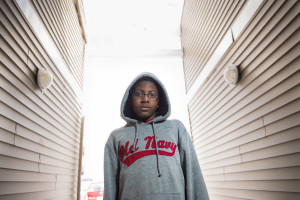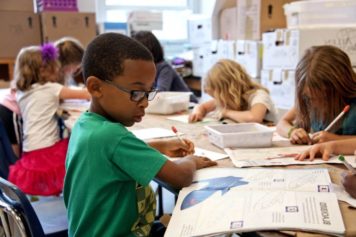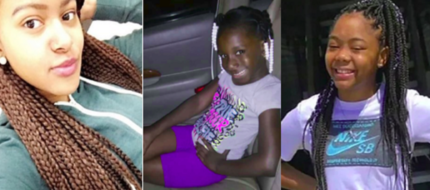Across the nation, horrific stories abound of Black students being severely punished for minor indiscretions that in a previous era might not have even gotten a rise out of the classroom teacher. But although the stories keep piling up, school administrators seem unwilling to come together to reverse the trend.
The overdisciplining of American students is a national problem directly linked to the explosion of the prison industrial complex over the last three decades. Commentators have come up with the term school-to-prison pipeline to describe a system that sends youngsters hurtling at a tender age onto a path that ends behind bars. For African-Americans, the path is especially treacherous—and crowded with Black bodies.
The latest outrage comes out of Virginia—a state that the Center for Public Integrity fingers as the state most likely to send students to jail. It involves a 12-year-old Black boy named Kayleb Moon-Robinson. Kayleb is autistic and the difficulties he’s facing are astounding, considering the innocuousness of his misbehavior.
His story, as described by Al Jazeera America, starts on the day he committed a misdeed at school: he kicked a trash can. He was dragged into juvenile court in Virginia and charged with disorderly conduct. As if that wasn’t bad enough, his next indiscretion was for violating a new rule that had been created just for him: he failed to stay behind in the classroom as his peers left. When the school resource officer came to bring him to the principal’s office for disobedience, Kayleb allegedly struggled and swore. In response, the officer reportedly slammed the boy down on a desk and handcuffed him.
And that was all it took to send the boy into the “system”—Kayleb is now being charged with felony assault on a police officer.
His future looks extremely cloudy—before it ever really had a chance to start.
All because he kicked a garbage can. That was the dangerous misbehavior that sent Kayleb into the disciplinary rabbit hole—something 12-year-old kids have been doing since the dawn of time.
As pointed out by Al Jazeera, Virginia is the state that demonstrated in the case of Reginald “Neil” Latson that it has no idea how to handle autism in the criminal justice system. When Latson was 19, he assaulted a police officer who questioned what Latson was doing loitering outside the public library. (He later said he was waiting for it to open.) The officer wound up with a shattered ankle and Latson wound up spending four years in the system, most of that in solitary confinement because the guards claimed he had violent tendencies. During one of the encounters, Latson, who had been taken off his medications and judged suicidal, was being transferred from a regular solitary confinement call to an even more spartan cell with no mattress and a hole in the floor for a toilet, according to the Washington Post. During the transfer, Latson wound up punching a guard in the head several times.
Commonwealth Attorney Eric Olsen said the guard tried to “assist” Latson in putting his hands on the wall. But autism experts testified that, like many with autism, Latson dislikes being touched and suffers from a “fight or flight” reaction when restrained. While the guard wasn’t injured, they used a Taser to subdue Latson.
After years in solitary confinement, Latson wound up being pardoned by Virginia Gov. Terry McAuliffe and released to a long-term residential treatment facility in Florida without having to serve anymore prison time.
Al Jazeera noted other Black children who have been mistreated by the system, such as Salecia Johnson, a 6-year-old girl in Georgia who was arrested for having a tantrum. Or Colton Granito, an autistic 8-year-old in Tennessee who was placed in a straitjacket and charged with assault.
Writer David M. Perry made the point on Al Jazeera that the zero-tolerance policies used in schools across America has created a “cult of compliance” that severely punishes any child who falls outside the education community’s dominant norms. That creates an especially precarious situation for Black children, who are much more likely to be seen as different and therefore disobedient. With the increased presence of police officers in schools in the wake of mass violence like the Columbine shooting, the results can be tragic.
“The cultural forces that punish diversity aren’t new,” Perry writes. “In the past, however, such perceived deviance might have met with bullying from peers or various forms of exclusion by teachers and other staffers. Today, jail beckons…No matter what these children were doing, anytime the solution involves placing a child in shackles, the people in charge have grotesquely failed.”
Perry lists recent cases the reveal the extent of the problem: A young athlete in Kansas who has Down syndrome was told to remove his letter jacket because, after a parent had complained that the young man didn’t deserve the jacket, the school decided there was no policy supporting special-needs athletes’ earning of letters. Another school took away a blind child’s cane because he waved the cane in the air. At another school, a 3-year-old deaf boy was told he could no longer sign his name with an H because it looked too much like a gun.
When a child acts disruptively, said Charles A. Bell, a doctoral candidate in sociology at Wayne State University and a critic of the impact of zero-tolerance policies on African-American youth, the worst thing you can do is to restrain or criminalize them—whether they have disabilities or not.
These policies, he said, “ignore all the socioemotional research that calls for deeper investigation into the causes behind problematic behavior in the classroom.”
“When educational institutions elevate bad policies over the well-being of individuals, they teach everyone the wrong lesson,” Perry writes. “It sends the message that compliance trumps empathy. Instead, our schools should demonstrate the value of our shared humanity and all types of diversity, including neurological diversity.”



